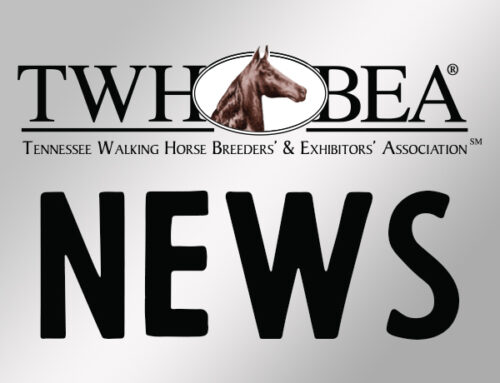The Tennessee Walking Horse Breeders’ & Exhibitors’ Association (TWHBEA) acknowledges the recent publication of the Notice of Final Rule by the United States Department of Agriculture (USDA) regarding amendments to regulations enforcing the Horse Protection Act (HPA).
First and foremost, we remain committed to collaborating with regulatory authorities to achieve our shared objectives and safeguard the future of the Tennessee Walking Horse industry, however we must express our deep concern regarding the proposed changes. The USDA’s attempt to enact sweeping alterations without adequate justification or supporting data is troubling. Such measures threaten to dismantle a significant portion of the Tennessee Walking Horse industry and impose an unwarranted and burdensome government takeover of the inspection system, which has been effectively enforcing regulations for nearly half a century.
The Horse Protection Act holds immense importance within our industry, as it not only ensures fair competition at horse shows but also safeguards the well-being of our equine companions. We unequivocally support the Act’s primary goal of eradicating the despicable practice of soring and penalizing those who engage in such cruelty. However, it is essential to avoid penalizing law-abiding participants due to the actions of a few bad actors. Our commitment to the welfare of our horses remains unwavering, and we stand ready to work collaboratively with regulatory bodies to uphold the integrity of our sport.
Furthermore, we advocate for equitable treatment within the broader equine community. If other show horses are permitted to utilize pads and action devices without adverse effects, then Tennessee Walking Horses should be afforded the same rights. Scientific evidence supports the contention that these practices do not harm the animals, and thus, there is no justification for their prohibition.
It is imperative to recognize the rigorous standards already in place within the Tennessee Walking Horse industry. Our shows are among the most regulated equestrian events nationwide, with every horse subjected to thorough inspections by USDA-approved organizations or USDA inspectors themselves. The incidence of violations remains low, a testament to our steadfast commitment to compliance and accountability. While we acknowledge the imperfections in the current system, we firmly believe that it is superior to the proposed alternative, which risks rendering many shows financially unsustainable and jeopardizing the future of our breed.
Central to our concerns is the potential impact on our grassroots community. Tennessee Walking Horse Shows serve as vital hubs for middle-class Americans, offering opportunities for competition and camaraderie in small communities across the nation. These events often serve as fundraising platforms for local civic groups, further underscoring their importance. Any regulatory changes must be implemented in a manner that preserves the accessibility and affordability of these shows, ensuring their continued viability and success.
In conclusion, the TWHBEA urges the USDA to reconsider the proposed rule and engage in meaningful dialogue with stakeholders to develop solutions that uphold the principles of fairness, equitability, and horse welfare.



